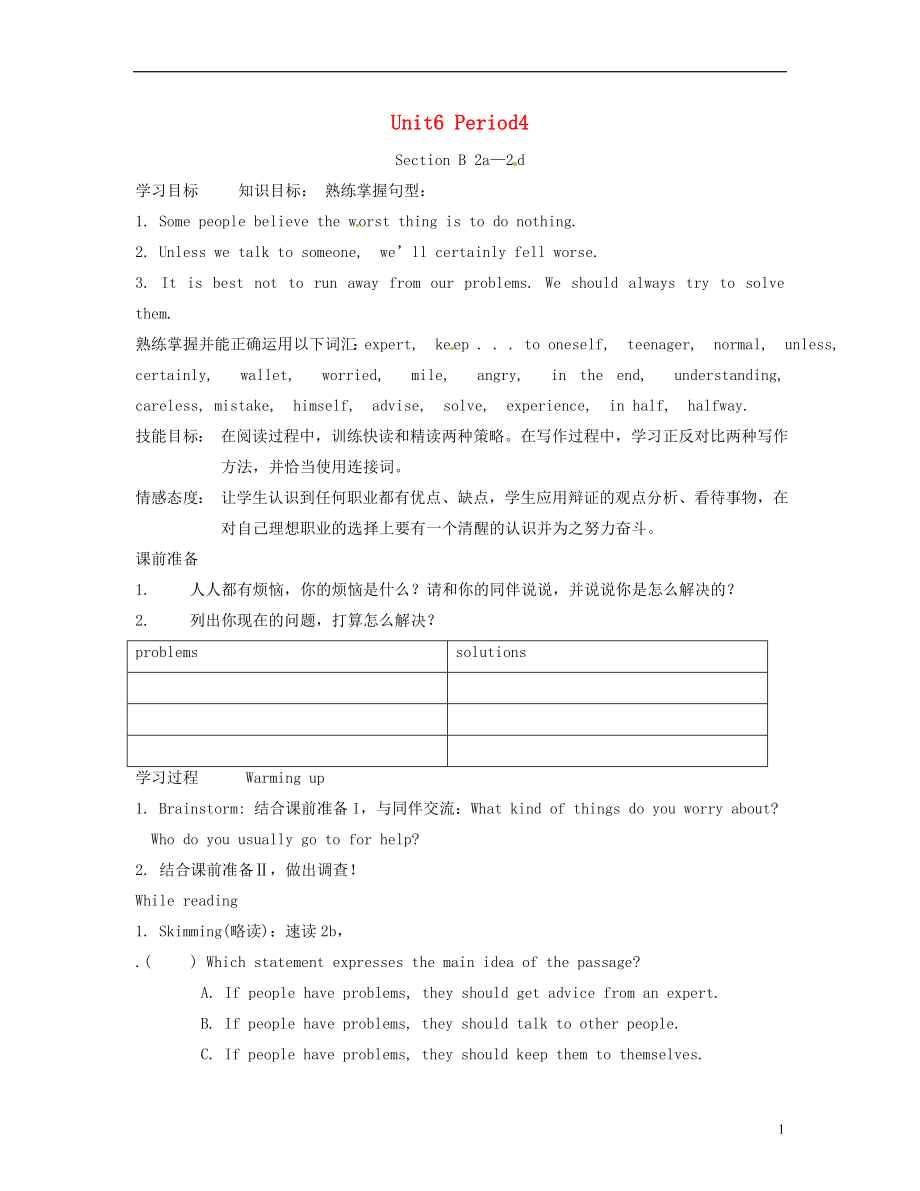《2021春七年級(jí)英語(yǔ)下冊(cè) Unit 6 If you go to the party, you’ll have a great timePeriod 4導(dǎo)學(xué)案 魯教版五四制》由會(huì)員分享����,可在線閱讀,更多相關(guān)《2021春七年級(jí)英語(yǔ)下冊(cè) Unit 6 If you go to the party, you’ll have a great timePeriod 4導(dǎo)學(xué)案 魯教版五四制(3頁(yè)珍藏版)》請(qǐng)?jiān)谘b配圖網(wǎng)上搜索���。
1��、
Unit6 Period4
Section B 2a—2d
學(xué)習(xí)目標(biāo) 知識(shí)目標(biāo): 熟練掌握句型:
1. Some people believe the worst thing is to do nothing.
2. Unless we talk to someone, we’ll certainly fell worse.
3. It is best not to run away from our problems. We should always try to solve them.
熟練掌握并能正確運(yùn)用以下詞匯:expert, keep . . . to
2、oneself, teenager, normal, unless, certainly, wallet, worried, mile, angry, in the end, understanding, careless, mistake, himself, advise, solve, experience, in half, halfway.
技能目標(biāo): 在閱讀過(guò)程中�,訓(xùn)練快讀和精讀兩種策略。在寫作過(guò)程中�����,學(xué)習(xí)正反對(duì)比兩種寫作方法,并恰當(dāng)使用連接詞����。
情感態(tài)度: 讓學(xué)生認(rèn)識(shí)到任何職業(yè)都有優(yōu)點(diǎn)、缺點(diǎn)����,學(xué)生應(yīng)用辯證的觀點(diǎn)分析、看待事物��,在對(duì)自己理想職業(yè)的選
3��、擇上要有一個(gè)清醒的認(rèn)識(shí)并為之努力奮斗�����。
課前準(zhǔn)備
1. 人人都有煩惱����,你的煩惱是什么?請(qǐng)和你的同伴說(shuō)說(shuō)���,并說(shuō)說(shuō)你是怎么解決的���?
2. 列出你現(xiàn)在的問(wèn)題�,打算怎么解決����?
problems
solutions
學(xué)習(xí)過(guò)程 Warming up
1. Brainstorm: 結(jié)合課前準(zhǔn)備I,與同伴交流:What kind of things do you worry about?
Who do you usually go to for help?
2. 結(jié)合課前準(zhǔn)備Ⅱ����,做出調(diào)查!
While reading
1. Skimming(略讀)
4��、:速讀2b����,
.( ) Which statement expresses the main idea of the passage?
A. If people have problems, they should get advice from an expert.
B. If people have problems, they should talk to other people.
C. If people have problems, they should keep them to themselves.
2. Scanning(找讀):
(1) 仔細(xì)閱讀2b,
5���、完成下面的任務(wù)���。
1.) What kinds of problems do students worry about? _______________________________
2.) What does Laura have problem? ______________________________________________
(2) 再讀2b, 判斷正誤(正確“T”,錯(cuò)誤“F”)����。
( ) 1.) Students these days often have lots of worries.
( ) 2.) Some people believe th
6、e best thing is to do nothing.
( ) 3.) Laura even walked three miles to school.
(3) 再讀2b, 回答問(wèn)題�。
1.)What is the worst thing to do if you have a problem? _____________________________
2.) Why didn’t Laura want to tell her parents about her lost wallet?
______________________________________
7、________________________
3.) What is the first thing you should do when you want to solve a problem?
______________________________________________________________
4. Why can our parents give us good advice about our problems?
_____________________________________________________________
8�、觀察與思考
(1) 觀察含有if的條件狀語(yǔ)從句,總結(jié)其特點(diǎn)���,并把它們翻譯成漢語(yǔ)���。
(2) If I tell my parents, they’ll be angry!
If you play sports for a living, your job will become rich.
And if you become rich, you will have a difficult time knowing who your real friends are.
※ 觀察這三個(gè)句子,主句用了____________(時(shí)態(tài))�����,從句用了______(時(shí)態(tài))���。
3. 聽(tīng)錄音并跟讀�����。
9��、4. 朗讀與復(fù)述:
After reading
1. 完成2d�,并大聲朗讀2d的短文。
2. 仿照2b或2d的寫作策略���,寫一篇小短文����。用上“if+will”句式(���。寫完后���,小組內(nèi)互相批閱,并寫上評(píng)語(yǔ)����。
3. Groupwork:故事接龍。Example: I think I’m going to go to the movies tonight. If I go to the movies, I won’t finish my homework. If I don’t finish my homework…
知識(shí)鞏固
Ⅰ. 根據(jù)句意和首字母提示完成單詞���。
1. To be a p
10�����、 _________ soccer player is my dream.
2. Many famous people give money to schools and c______________.
3. He was ill. H________, he went to school on time.
4. Teachers’ Day is coming. I’ll give some f________ to our teachers.
5. Yesterday she was badly __________(受傷)����,so she didn’t go to work.
11、Ⅱ. 按要求完成句子�,每空一詞。
1. Take more exercise and you’ll be healthy.(寫出同義句)
__________ __________take more exercise, you’ll be healthy.
2. The old man sells newspapers for a living.(寫出同義句)
The old man ________ ___________ __________ ___________newspapers.
3. He is too small, so he can’t help his moth
12����、er.(寫出同義句)
He is _________small _______ help his mother.
4. Jim enjoyed himself in the park.(寫出同義句)
Jim _______ _________ ____________ __________ in the park.
5. You can’t bring friends from other schools to the party.(改為祈使句)
_______ ________ friends from other schools to the party.
課堂反思
1. 當(dāng)我們有問(wèn)題的時(shí)候���,我們應(yīng)分析其優(yōu)點(diǎn)和缺點(diǎn)��,以便指導(dǎo)好自己的選擇��。在描述完優(yōu)點(diǎn)����,轉(zhuǎn)入描述缺點(diǎn)時(shí)�,我們可使用如__________這類的表轉(zhuǎn)折的連詞。談?wù)撝形覀儠?huì)用到哪些語(yǔ)言結(jié)構(gòu)呢�����?
2. 通過(guò)本節(jié)課的學(xué)習(xí)�����,你還有哪些沒(méi)有掌握?請(qǐng)做出標(biāo)記�。
家庭作業(yè)
1. 熟讀2b,并牢記2b中的短語(yǔ)。
2. 仿照2b或2d寫出你的問(wèn)題���,仿寫一篇小短文���。
3. 依據(jù)學(xué)習(xí)目標(biāo),預(yù)習(xí)下一個(gè)學(xué)案的課前準(zhǔn)備����。
3
 2021春七年級(jí)英語(yǔ)下冊(cè) Unit 6 If you go to the party, you’ll have a great timePeriod 4導(dǎo)學(xué)案 魯教版五四制
2021春七年級(jí)英語(yǔ)下冊(cè) Unit 6 If you go to the party, you’ll have a great timePeriod 4導(dǎo)學(xué)案 魯教版五四制

